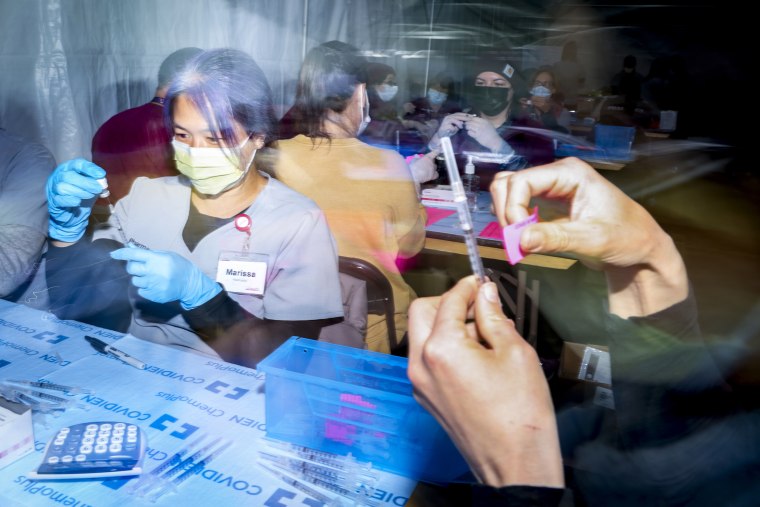The U.S. hit a new high for the number of daily Covid-19 vaccinations Saturday: 4 million. The record was set as vaccinations have steadily risen over recent weeks, bringing the daily average to more than 3 million.
That means more people in the U.S. are receiving one dose of a Covid-19 vaccine every day. For the majority, who will get either the Pfizer-BioNTech or the Moderna vaccine, it's just the first dose; in three to four weeks, they'll return for a second.
But is a person protected after just the first shot?
Full coverage of the coronavirus outbreak
Only if the vaccine was Johnson & Johnson's one-dose shot. For the two other vaccines available in the U.S., it's essential that people who get a two-dose vaccine shot go back for the second to be fully protected, experts say.
People who are partly vaccinated shouldn't change their behavior, said Dr. Paul Offit, director of the Vaccine Education Center at Children's Hospital of Philadelphia, who is a member of the Food and Drug Administration's vaccine advisory committee. Instead, they should sit tight until they have completed their vaccination series.
"It just frightens me that we have, in any sense, put out there the notion that [Pfizer and Moderna] are anything other than a two-dose vaccine," Offit said.
The Centers for Disease Control and Prevention reported last week that the first doses of the Pfizer and the Moderna vaccines were 80 percent effective at preventing infection. The protection was measured two weeks after the first doses but before the second.
During a briefing Monday by the White House Covid-19 response team, Dr. Anthony Fauci, the government's leading infectious disease expert, qualified the findings, saying, "It is somewhat of a tenuous 80 percent."
"The question," Fauci said, "is how long does [that protection] last?"
Offit said, "The best reason to wait for that second dose is you want to get durable immunity."
Research from Pfizer, released last week, showed that protection lasted at least six months in people who received both doses of the vaccine.
"Getting the second dose is going to be really important for lasting protection," said Dr. Peter Hotez, co-director of the Center for Vaccine Development at Texas Children's Hospital and dean of the National School of Tropical Medicine at Baylor College of Medicine.
What's more, two doses of the Pfizer vaccine — not one — appear to protect against certain variants of the coronavirus, including the variant that was first detected in South Africa, Pfizer said last week.
It's after the second dose, Offit said, that protection against variants really kicks in.
Download the NBC News app for full coverage of the coronavirus outbreak
Offit and Hotez said the second dose of an mRNA vaccine, like Pfizer's and Moderna's, elicits a much more robust immune response than a single dose.
The second dose signals to the immune system that the coronavirus is worth mounting a long-term response against, said Michal Tal, an immunologist at Stanford University.
"For the immune system, it really does matter if you continue to see something," she said, referring to the second dose. "If you see it again, that's a signal that this is something worth dedicating a lot of energy to and making a strong memory response against."
The single-dose Johnson & Johnson vaccine, on the other hand, leads to a similarly robust immune response after just one dose.
Even so, as vaccinations have picked up across the country, Tal said she has been getting more questions about whether it was necessary for people to return for their second mRNA vaccine doses, especially if they experienced side effects after the first. (The side effects can include arm soreness to fever and chills, lasting up to a day or two.)
Her unequivocal answer is yes.
"The side effects that you face are worth having that strong immune response that is going to protect you from the actual virus," she said.
Follow NBC HEALTH on Twitter & Facebook.

